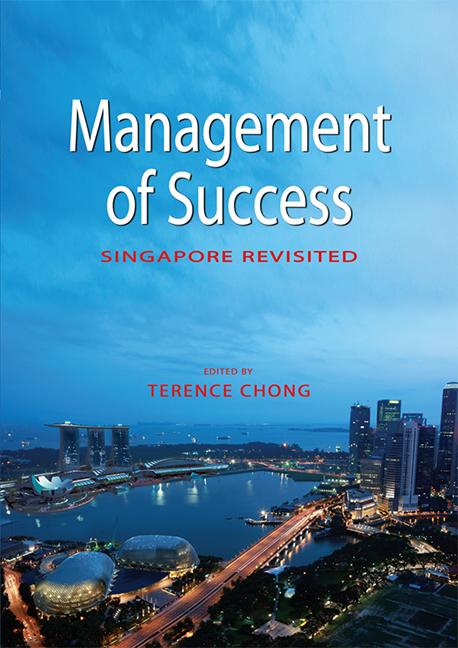Book contents
- Frontmatter
- Contents
- List of Tables and Figures
- Foreword
- Message
- Quote
- Preface
- The Contributors
- 1 Introduction: The Role of Success in Singapore's National Identity
- SECTION 1 SINGAPORE IN THE BIGGER PICTURE
- SECTION 2 LEADERSHIP, POLICY AND POLITICS
- SECTION 3 THE RESTRUCTURING OF THE ECONOMY
- SECTION 4 THE TRANSFORMATION OF SOCIETY
- 11 The Ageing Population
- 12 Managing Labour Flows: Foreign Talent, Foreign Workers and Domestic Help
- 13 Social Mobility in Singapore
- 14 Singapore's Print Media Policy: A National Success?
- 15 Control-shift: The Internet and Political Change in Singapore
- 16 The Transformation of Meritocracy
- 17 Education in Singapore: Sorting Them Out?
- 18 Religious Diversity in Singapore
- SECTION 5 THE LAW
- SECTION 6 MODIFICATION OF THE ENVIRONMENT
- SECTION 7 COMMUNITY AND NATIONAL SECURITY
- SECTION 8 LIFE IN SINGAPORE
- Index
12 - Managing Labour Flows: Foreign Talent, Foreign Workers and Domestic Help
from SECTION 4 - THE TRANSFORMATION OF SOCIETY
Published online by Cambridge University Press: 21 October 2015
- Frontmatter
- Contents
- List of Tables and Figures
- Foreword
- Message
- Quote
- Preface
- The Contributors
- 1 Introduction: The Role of Success in Singapore's National Identity
- SECTION 1 SINGAPORE IN THE BIGGER PICTURE
- SECTION 2 LEADERSHIP, POLICY AND POLITICS
- SECTION 3 THE RESTRUCTURING OF THE ECONOMY
- SECTION 4 THE TRANSFORMATION OF SOCIETY
- 11 The Ageing Population
- 12 Managing Labour Flows: Foreign Talent, Foreign Workers and Domestic Help
- 13 Social Mobility in Singapore
- 14 Singapore's Print Media Policy: A National Success?
- 15 Control-shift: The Internet and Political Change in Singapore
- 16 The Transformation of Meritocracy
- 17 Education in Singapore: Sorting Them Out?
- 18 Religious Diversity in Singapore
- SECTION 5 THE LAW
- SECTION 6 MODIFICATION OF THE ENVIRONMENT
- SECTION 7 COMMUNITY AND NATIONAL SECURITY
- SECTION 8 LIFE IN SINGAPORE
- Index
Summary
A GLOBAL WORKSITE
One of the many challenges that Singapore has always had to address as an independent nation is ensuring the sustainability and adequacy of its labour force. Being a country that has virtually nothing to offer in terms of generating economic wealth but human resources and skillful economic planning, a robust labour force becomes an ever vital factor of production in responding to globalization. Singapore's shrinking population base also adds to this challenge and together these have made it necessary for Singapore to continue to welcome labour from overseas. It has been more than four decades since Singapore started to open its doors to migrant workers, a move motivated by economic need. However, the impact of such a policy transcends the economic sphere and is felt in the social, cultural and political spheres. The ubiquitous (and increasing) presence of foreigners of different classes and nationalities in the country has, to a significant extent, impacted on the country's social and cultural landscapes. This brings about new challenges for the state in managing relations with the citizenry and the international community and balancing these with longterm economic survival.
In the 1989 volume of Management of Success, when examining the inflow of skilled workers into the local labour market, Pang, Tan, and Cheng concluded that “The possible displacement of local expertise by the foreign talent and the apparent inequalities in the income, housing, and fringe benefits between expatriates and locals have not yet become issues of contention”. This chapter serves to update this conclusion firstly by outlining the policies governing the flows of two segments of migrant workers into Singapore — skilled workers taking up white-collar jobs, and immigrant workers who perform manual work in various sectors of the economy. Secondly, the chapter provides a brief description of the composition of migrants in the Singapore workforce. Thirdly, it describes the contrasting policies governing the flows of the two groups of migrant workers, uncovering the values and principles underlying these policies. Fourthly, the chapter highlights two significant tensions that have emerged from Singapore's openness to migrant workers and describes how these bring about challenges to the state. Lastly, the chapter concludes that in managing these challenges, the government thus far has prioritized economic goals and the interests of its citizenry.
- Type
- Chapter
- Information
- Management of SuccessSingapore Revisited, pp. 199 - 216Publisher: ISEAS–Yusof Ishak InstitutePrint publication year: 2010



